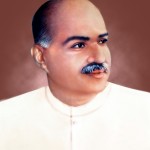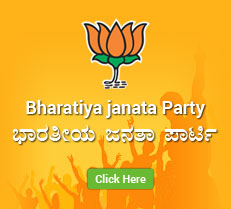BJP – FORGING AHEAD IN KARNATAKA
 Founded by Dr. Shyamaprasad Mukherji, the Bharatiya Janasangh was becoming popular in Karnataka. The party soon came to be noticed by the common people and the intellectuals, who earlier had the impression that the Congress was the only political party in the country. Great orators like Karnataka Kesari Jagannatha Rao Joshi travelled to every District in Karnataka and mesmerized people with their inspiring talk. People across party lines would come to listen to his speech. They would wait for long hours for his speech as if they had come to listen all-night harikathas. His talks instilled patriotism in people; he would explain the hardships faced by the people and the wrongdoing of the Congress Government in a witty manner. He popularised Janasangh and was instrumental in strengthening the party.
Founded by Dr. Shyamaprasad Mukherji, the Bharatiya Janasangh was becoming popular in Karnataka. The party soon came to be noticed by the common people and the intellectuals, who earlier had the impression that the Congress was the only political party in the country. Great orators like Karnataka Kesari Jagannatha Rao Joshi travelled to every District in Karnataka and mesmerized people with their inspiring talk. People across party lines would come to listen to his speech. They would wait for long hours for his speech as if they had come to listen all-night harikathas. His talks instilled patriotism in people; he would explain the hardships faced by the people and the wrongdoing of the Congress Government in a witty manner. He popularised Janasangh and was instrumental in strengthening the party.
Under the able guidance of Shri. Joshi, Shri Bhavurao Deshpande, an experienced Sangh Pracharak, became the organizing secretary of the party. His organizing skills and intellectual ability attracted many intellectuals and influential people into the party fold. Bhavurao had a way of mixing with people – he used to be an elder with elders and youngsters with younger people. He led a simple life, being a model for others to follow.
Shri. A.K.Subbaiah, with his inspiring speeches and experience in the assembly, was instrumental in the party’s growth. When the party was in its infancy, Dr.K.S.Dattaatri, a popular medical doctor from Shimoga became the State President. Janasangh grew in strength in Karnataka due to the efforts of Varadaraja Shetty, Mallikarjunaiah, Karmaballi Sanjeeva Shetty, Dr.V.S.Acharya, and D.H. Shakaramurthy among others.
In the year 1980, when the party emerged as the Bharatiya Janata Party (BJP) with a new look, the party leaders had a meeting in Lalbagh Silver Jubilee Hall MLC Shri A.K.Subbaiah was elected as the President. More and more young people were attracted to BJP’s philosophy. Several Rashtreeya Swayamsevak Sangh (RSS) workers started working for the BJP. The BJP came to be known as the party of the youth. The party had the guidance of persons like the country’s greatest statesman Shri. Atal Behari Vajpayee, Shri. Lal Krishna Advani, Dr. Murli Manohar Joshi, Shri. Jagannatha Rao Joshi, Smt Vijaya Raje Scindia, Shri. Sunder Singh Bhandari, Shri. Kedarnath Sal, and Shri. V.K. Malhotra. Under the able guidance of Shri. Bhavurao, Shri A.K. Subbaiah was instrumental in expanding the party. During 1983 State Assembly Elections BJP was a force to be reckoned with. People were fed up of the Congress misrule. To route out the Congress, the BJP even thought of a seat sharing agreement with the Janata Party. However, the power-hungry leaders of the Janata Party Shri Ramakrishna Hegde, Shri Devegowda and Shri S.R. Bommai did not allow the talks to progress.
Under the able leadership of Shri A.K. Subbaiah, the BJP did not tie up with any party and by its own strength it faced the elections and was successful in getting 18 seats. The Janata Party won 61 seats. Janata Party, who boasted that “BJP cannot win any seats, we will win by majority,” had learnt a bitter lesson.
Shri Ramakrishna Hedge, who was dreaming of becoming a Chief Minister, tried to get the support of nine independent candidates. When they did not get the required majority to form a government, Shri Hedge sought the support of BJP. However, Shri A.K. Subbaiah, who did not like the behaviour of these leaders, did not agree. Getting the scent of this, Shri. Hedge approached the National President Shri Atal Behari Vajpayee and got his approval. Shri Atalji agreed to support Hegde, with an intention to support a non-Congress government in the state.
The BJP-supported Janata Party came to power in the state in 1983 with Shri Ramakrishna Hegde as the Chief Minister. The BJP supported the government from outside. Without any doubt, this support alone helped Shri Hegde to become a CM and helped him gain so much popularity today. However instead of being grateful to the BJP, Shri Hegde began to claim that he was responsible to bring in political change in the state and began to neglect the BJP. He was successful in improving his stature and image by befriending the then BJP leader Shri B.B.Shivappa, but neglected the advice of other MLA. Meanwhile, Shri A.K.Subbaiah attributed the growth of BJP in the state to his own efforts and behaved badly with BJP’s senior leaders. He also strongly criticized RSS workers, whom he used to praise earlier. He also did not care for the party discipline. This resulted in his removal from the party. Shri B.B. Shivappa was elected as the President. Shri Bhavurao Deshpande ably guided the new president and in an effort to bring back the glory to the party travelled across the state continuously neglecting his health. Shri Shivappa also contributed his time and energy to resurrect the party.
Impressed by Shri Shivappa’s activities, Shri Bhavurao gave him an opportunity to contest the Vidhana Parishat from the assembly segment. The party supported Shri Shivappa to enter the Vidhana Parishat over senior persons like Shri S.B. Sheshadri, a senior lawyer and experienced worker. Thus the party progressed in spite of facing many teething problems period when it was built by its capacity. At this point, several youth leaders made efforts to project BJP as a common man’s party, as it is known in Northern states. Following the assassination of Smt. Indira Gandhi, the nation went to polls in 1984. The sympathy wave resulted in the Congress coming to power with a whopping majority of 403 seats. The situation would have been different had the elections been held without the background of Smt. Gandhi’s assassination. The Congress would have lost the elections and a coilition government would have come to power at the Centre. However, the assassination changed the political equation in the country. It was a tragedy that Shri Atal Behari Vajpayee lost in the elections.
Intellectuals from Congress and other parties sympathized for Atalji’s defeat in the elections. Common people also expressed their shock and disbelief the defeat suffered by a great parliamentarian like him. This was a boon for the opponents of BJP, who campaigned that the BJP had been finished.
After this defeat, Shri Vajpayee paid a visit to Bangalore. In a large gathering of party workers and people he clearly declared “na dainyam na palayanam,” which energized the party workers and well-wishers. Meanwhile, in 1985, in Karnataka, Shri Hegde had to resign and Janata Party had to go for assembly elections. The BJP supported the two-year Janata rule, which brought personal glory to Shri Hegde.
Though BJP had fully supported the ruling Janata party for two years, Shri Hegde opposed coalitions with BJP for the 1985 elections. He claimed that the achievements of his government were his own and was successful in gaining majority votes in the elections. This was a big blow to BJP, which earlier had 18 seats but now could retain only two seats.

